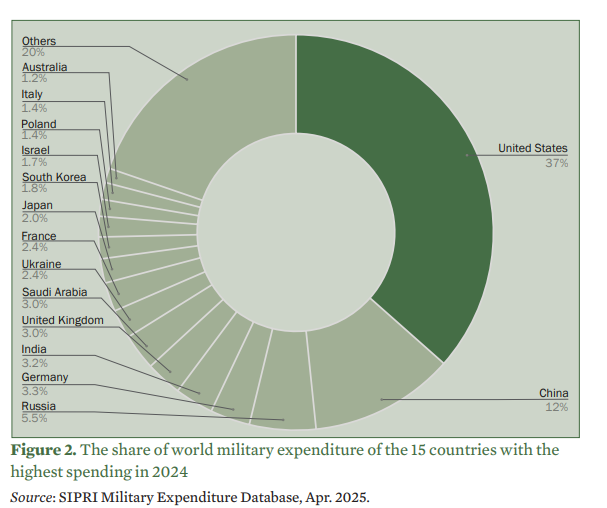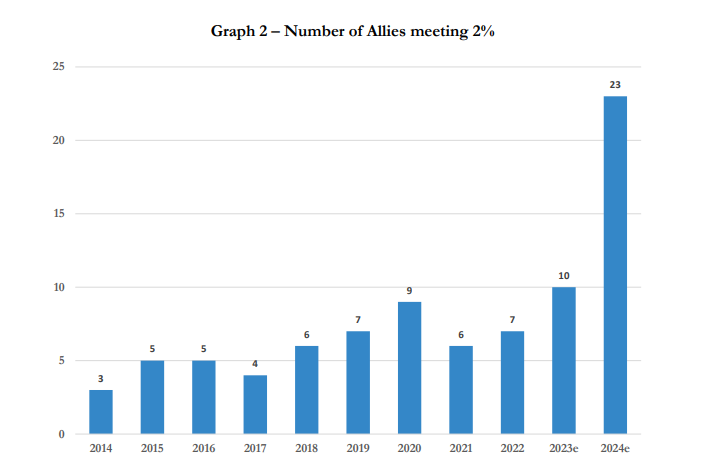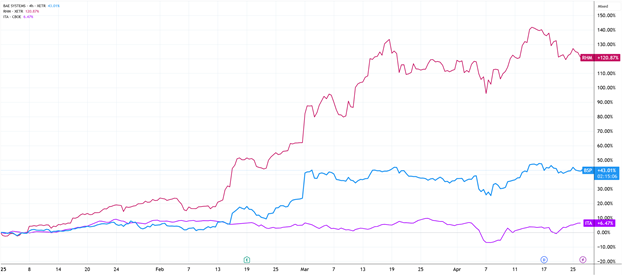World Military Spending Rises Most In 2024 Since End Of Cold War

World military expenditure had the steepest year-on-year rise since at least the end of the Cold War, driven by an increase in spending by Europe after Russia’s invasion of Ukraine.
Global defense spending climbed to $2.72 trillion in 2024, an increase of 9.4% in real terms from 2023, the Stockholm International Peace Research Institute (SIPRI) said today. Military spending in Europe, including Russia, rose by 17% to $693 billion. It was the main contributor to the global increase in 2024.
The top five military spenders – the US, China, Russia, Germany and India – accounted for 60% of the global total, according to SIPRI. Their combined spending was $1.64 trillion, SIPRI said. At $997 billion, the US represented 37% of all global military spending last year.
“Over 100 countries around the world raised their military spending in 2024,” Xiao Liang, Researcher with the SIPRI Military Expenditure and Arms Production Programme, said.
“As governments increasingly prioritize military security, often at the expense of other budget areas, the economic and social trade-offs could have significant effects on societies for years to come.”
European Fiscal Limits May Hurt Arms Spending
In Europe, fiscal realities may curtail defense spending ambitions.
France, one of the continent’s top military powers and the European Union’s (EU) second-largest economy, is grappling with a budget deficit. Italy’s debt-to-GDP ratio is expected to spike to around 138% in 2026. The International Monetary Fund projected that Germany would stagnate this year.
Germany has asked the EU to activate an emergency clause that would allow it to rapidly increase defense investment without breaching the bloc’s spending rules, POLITICO reported today. The US publication cited a letter dated April 24 written by acting Germany Finance Minister Jörg Kukies
Germany’s military expenditure increased 28% to $88.5 billion, making it the biggest spender in Central and Western Europe. Poland’s military spending expanded by 31% to $38.0 billion in 2024, or 4.2% of Poland’s GDP.
Russia’s Invasion of Ukraine Spurs European Defense Spending
Russia’s invasion of Ukraine in February 2022 marked a critical turning point in defense calculations. In Europe, President Vladimir Putin’s decision to send troops into Ukraine destroyed the notion of perpetual peace as Western leaders watched a reintroduction of high-intensity land warfare near their borders.
In the latest development, Putin announced today a temporary ceasefire in the war in Ukraine “based on humanitarian considerations.” The Kremlin has said the ceasefire will run from the morning of May 8 until May 11. This date coincides with victory celebrations to mark the end of World War II.

European Union (EU) leaders in March pledged to bolster “decisively” the bloc’s defense capabilities within the next five years. European Commission President Ursula von der Leyen announced plans to allocate €800 billion for defense spending as part of the EU’s “ReArm Europe Plan” or “Readiness 2030.”
“The rapid spending increases among European NATO members were driven mainly by the ongoing Russian threat and concerns about possible US disengagement within the alliance,” Jade Guiberteau Ricard, Researcher with the SIPRI Military Expenditure and Arms Production Programme, said. “It is worth saying that boosting spending alone will not necessarily translate into significantly greater military capability or independence from the USA.”
Russia has also rearmed. Moscow’s military expenditure reached an estimated $149 billion in 2024, a 38% increase from 2023. That is double the level in 2015. This represented 7.1% of Russia’s GDP and 19% of all Russian government spending.
All NATO Members Increase Defense Spending
US President Donald J. Trump has fueled Europe’s push to rearm, fearful that the US is ushering a shift in the global order. European capitals have been alarmed by Washington’s push for a peace deal between Russia and Ukraine without EU involvement.
During Trump’s first term, he pressured European North Atlantic Treaty Organization (NATO) members to increase their defense spending to 2% of GDP. In 2017, only four NATO members had reached the alliance’s target.
Of the 32 NATO members, 18 spent at least 2.0% of GDP on their militaries, according to SIPRI, up from 11 in 2023. Total military spending by NATO members amounted to $1.51 trillion, or 55% of global military expenditure.
All NATO members increased their military expenditure in 2024, SIPRI said. NATO had forecasted that 23 members would reach the 2% target in 2024.

Source: NATO
In 2024, the United Kingdom increased its military expenditure by 2.8% to $81.8 billion, making it the sixth biggest spender worldwide, according to SIPRI. Military expenditure by France rose by 6.1% to reach $64.7 billion, making it the ninth biggest spender, SIPRI said.
European Arms Makers Gain From Spending Increase
European defense stocks have garnered interest from institutional investors, as positive momentum persists despite Trump’s tariff threat.
The largest European defense contractor, BAE Systems BAESF, has climbed over 42% year-to-date. The German Rheinmetall AG RNMBF rose as much as 120% after the German parliament committed to boosting spending in the sector.

Rheinmetall, BAE Systems, US Aerospace & Defense sector, year-to-date: Source: TradingView
Private equity firms are scouting Europe for investment opportunities in the sector, which has been overlooked for a long time. Paris-based Tikehau is reportedly raising an €800 million aerospace and defense fund. It has already collected more than half the target amount.
Serge Weinberg’s Weinberg Capital Partners and NYC-based Veritas Capital have also shown interest in similar funds. Per Bloomberg’s data, private equity spending on the defense sector reached $1 billion in just five out of the last 20 years, yet in 2025 it has already passed $790 million.
“The defense sector looks like it will prove to be an exception to the broader downturn we are experiencing in dealmaking,” Frank Bretag, head of industrial advisory at UniCredit SpA, said. He added that he expects European governments’ defense spending to increase.
Disclaimer:
Any opinions expressed in this article are not to be considered investment advice and are solely those of the authors. European Capital Insights is not responsible for any financial decisions made based on the contents of this article. Readers may use this article for information and educational purposes only.
This article is from an unpaid external contributor. It does not represent Benzinga’s reporting and has not been edited for content or accuracy.
© 2025 Benzinga.com. Benzinga does not provide investment advice. All rights reserved.



